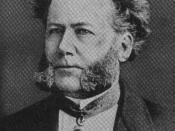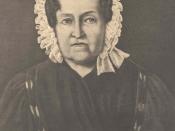Loyalty, duty, obligation. These are only some of the social
laws that Henrik Ibsen wrote out against in his later works. Ibsen believed
that these bourgeois beliefs were hindering the individual's, as well as the
nation's, realization of the self. To Ibsen, it was far more important to
have the freedom to express oneself than to adhere to outdated,
conventional ideas. In "A Doll House" and "Ghosts", both heroines are
forced to confront these social hindrances. Both women attempt to
overcome these powerful restraints in their attempts to find themselves,
one more successfully than the other.
"Ibsen's effect on his contemporaries and his influence on the
course of modern drama were immediate and profound".1 More than any
other dramatist, he gave theater a new vitality by bringing into European
bourgeois drama an ethical gravity, a psychological depth, and a social
significance which the theater had lacked since the days of Shakespeare.
For the better part of fifty years, Ibsen contributed to giving European
drama a vitality and artistic quality comparable to the ancient Greek
tragedies. This contribution to theatrical history gained for Ibsen the
reputation of being the greatest and most influential dramatist of his time.
He "gave the stage its first distinctively modern characters:
complex, contradictory individuals driven by a desire for something - the
'joy of life', a sense of themselves - that they can barely recognize or
name".2 His realistic contemporary drama was a continuation of the
European tradition of tragic plays.
In these plays he portrays ordinary middle class people of his
day. Routines, and schedules usually taken for granted, are suddenly
turned upside down as they are forced to confront a major crisis. Nora, in
"A Doll House", must finally confess to her husband that she borrowed
money illegally in a...


